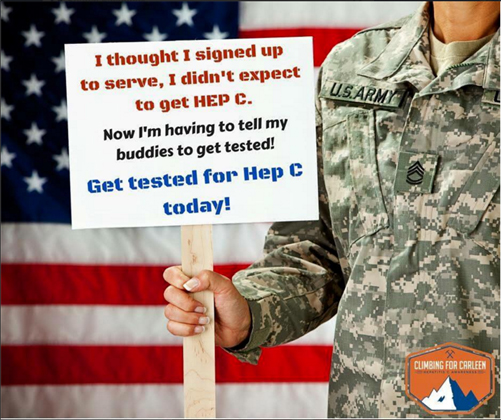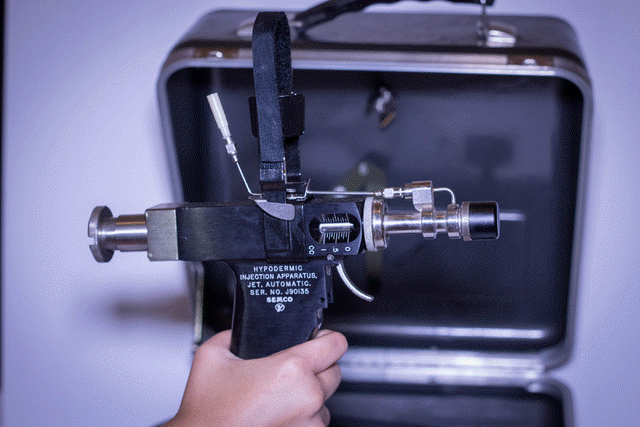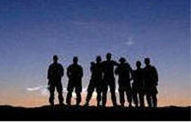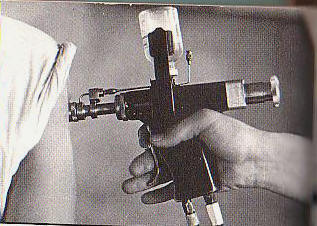VA Service Connection- Jetgun
Win!
Member Shawn fought the Board of
Veterans Appeals (BVA) over
his father's death from hepatitis C
and won. Shawn offers us advice on
what to do after the win that will
help all Vets who received these
deadly injections.
Thank you Shawn for never giving
up. Your father would be so proud of
you. I know we are!
Shaw writes: "Last winter, before
the judgment came through, I thought
about what "justice" would mean to
me. I thought what if we won but I
still don't feel a sense of justice
was served?
After watching documentaries I
learned to redefine justice. To me,
justice for my dad includes winning
the BVA appeal, promoting awareness
of HCV and jet injectors through
publications in the media, and
filing a complaint with the FDA to
make it more difficult for airgun
manufacturers to obtain FDA
approval.
I am filing a complaint with the
FDA's MedWatch. and encourages
everyone who won an air/jetgun claim
to do the same.
My father was a great man and
didn't deserve to die like this. If
you won your claim based on jetgun/airgun
injections, please take one more
step and help prove the danger these
devices posed.
The Board finds that these
physician's opinions express support
for the proposition that the
Veteran's hepatitis C was related to
active service, specifically air gun
immunizations therein.
Citation Nr: 1418447
Decision Date: 04/25/14 Archive
Date: 05/02/14
http://www.va.gov/vetapp14/Files2/1418447.txt
DOCKET NO. 10-47 291 )
On appeal from the
Department of Veterans Affairs
Regional Office in Buffalo, New York
THE ISSUE
Entitlement to service connection
for the cause of the Veteran's
death.
REPRESENTATION
Appellant represented by: The
American Legion
ATTORNEY FOR THE BOARD
N. J. Nardone, Associate Counsel
INTRODUCTION
The Veteran had active service from
March 1970 to March 1974. The
Veteran died in January 2009. The
appellant is the Veteran's surviving
spouse.
This case comes before the Board of
Veterans' Appeals (Board) on appeal
from a July 2009 rating decision by
the Department of Veterans Affairs
(VA) Regional Office (RO) in
Buffalo, New York.
The Board notes that the appellant
testified before the undersigned
Veterans Law Judge in April 2012,
but a transcript of that hearing
could not be produced. The appellant
was offered the opportunity for
another Board hearing and accepted.
However, the Board has determined
that the evidence currently of
record is sufficient to establish
the appellant's entitlement to the
benefit sought on appeal. Therefore,
further delay of the appellate
process for the purpose of affording
the appellant another hearing would
serve no useful purpose.
The Board notes that, in addition to
the paper claims file, there is a
Virtual VA electronic claims file
associated with the appellant's
appeal.
FINDINGS OF FACT
1. The Veteran died in January 2009
from gastrointestinal bleeding, due
to or as a consequence of esophageal
varices and cirrhosis, with
hepatitis C as a contributory cause
of the Veteran's death.
2. At the time of his death, the
Veteran was not service-connected
for any disability.
3. The Veteran's hepatitis C was
etiologically related to active
service.
CONCLUSION OF LAW
A disability incurred in or
aggravated by active service caused
or contributed substantially or
materially to the cause of the
Veteran's death. 38 U.S.C.A. § 1310
(West 2002); 38 C.F.R. § 3.312
(2013).
REASONS AND BASES FOR FINDINGS AND
CONCLUSION
I. Duties to Notify and Assist
As a preliminary matter, the Board
notes that the appellant has been
provided all required notice. In
addition, the evidence currently of
record is sufficient to substantiate
her claim for service connection for
the cause of the Veteran's death.
Therefore, no further development is
required under 38 U.S.C.A. §§ 5103,
5103A (West 2002 & Supp. 2013) or 38
C.F.R. § 3.159 (2013).
II. General Legal Criteria
Dependency and Indemnity benefits
are payable to the surviving spouse
of a veteran if the veteran died
from service-connected disability.
38 U.S.C.A. § 1310; 38 C.F.R. § 3.5
(2013). Service connection for the
cause of a Veteran's death is
warranted if a service-connected
disability either caused or
contributed substantially or
materially to the cause of death. 38
U.S.C.A. § 1310; 38 C.F.R. § 3.312.
Service connection may be granted
for disability resulting from
disease or injury incurred in or
aggravated by active service. 38
U.S.C.A. § 1110; 38 C.F.R. § 3.303
(2013). Service connection may be
granted for any disease initially
diagnosed after service when all the
evidence, including that pertinent
to service, establishes that the
disease was incurred in service. 38
C.F.R. § 3.303(d).
Risk factors for hepatitis C include
intravenous (IV) drug use, blood
transfusions before 1992,
hemodialysis, intranasal cocaine,
high-risk sexual activity,
accidental exposure while a health
care worker, and various kinds of
percutaneous exposure such as
tattoos, body piercing, acupuncture
with non-sterile needles, shared
toothbrushes or razor blades. See
VBA letter 211B (98-110) November
30, 1998.
A VA Fast Letter (FL) issued in June
2004 (FL 04-13, June 29, 2004)
identified "key points" that
included the fact that hepatitis C
is spread primarily by contact with
blood and blood products, with the
highest prevalence of hepatitis C
infection among those with repeated,
direct percutaneous (through the
skin) exposure to blood (i.e.,
intravenous drug users, recipients
of blood transfusions before
screening of the blood supply began
in 1992, and hemophiliacs treated
with clotting factor before 1987).
Another "key point" was the fact
that hepatitis C can potentially be
transmitted with the reuse of
needles for tattoos, body piercing,
and acupuncture. It was concluded in
FL 04-13 that the large majority of
hepatitis C infections can be
accounted for by known modes of
transmission, primarily transfusion
of blood products before 1992, and
injection drug use.
Except as otherwise provided by law,
a claimant has the responsibility to
present and support a claim for
benefits under laws administered by
the Secretary. The Secretary shall
consider all information and lay and
medical evidence of record in a case
before the Secretary with respect to
benefits under laws administered by
the Secretary. When there is an
approximate balance of positive and
negative evidence regarding any
issue material to the determination
of the matter, the Secretary shall
give the benefit of the doubt to the
claimant. 38 U.S.C.A. § 5107 (West
2002); 38 C.F.R. § 3.102 (2013); see
also Gilbert v. Derwinski, 1 Vet.
App. 49, 53 (1990).
To deny a claim on its merits, the
evidence must preponderate against
the claim. Alemany v. Brown, 9 Vet.
App. 518, 519 (1996), citing
Gilbert, 1 Vet. App. at 54.
III. Analysis
The Veteran died in January 2009. A
January 2009 certificate of death
lists the immediate cause of death
as gastrointestinal bleeding, due to
or as a consequence of esophageal
varices and cirrhosis. The
certificate of death also listed
"past hepatitis C" as a significant
condition contributing to death, but
not related to gastrointestinal
bleeding.
At the time of his death, the
Veteran was not service-connected
for any disability.
The appellant contends that the
Veteran's diagnosed Hepatitis C was
due to air gun immunizations during
service.
Private treatment records reveal
that in 1987 the Veteran's
laboratory reports were strongly
suggestive of liver disease,
although he was asymptomatic. A May
1987 treatment report indicates that
the Veteran was an occasional
imbiber of alcohol but had been
abstaining since January of that
year. The Veteran had no toxic
exposure, took no medication, and
had no contact with anyone with
hepatitis. He also had never had a
transfusion and had no foreign
travel. The impression was of
abnormal liver function tests, rule
out chronic active hepatitis.
VA treatment records show that
during the Veteran's initial
evaluation for hepatitis C in August
2002, it was noted that his risk
factors for the disease were
unexplained.
In support of her claim, the
appellant submitted a February 2009
letter from a private physician who
indicated that he had been caring
for the Veteran as his
gastroenterologist and hepatologist.
This physician opined that the
Veteran at least as likely as not
contracted hepatitis C from an air
gun incident as opposed to other
risks, such as intravenous drug use,
tattoos, or blood transfusions.
Additionally, the appellant
submitted a February 2009 letter
from another private physician, who
indicated that she had been the
Veteran's family physician. She
indicated that the Veteran died of
massive gastrointestinal bleeding
resulting from esophageal varices,
which developed as a consequence of
cirrhosis of the liver related to
chronic hepatitis C infection. The
physician stated that in her
opinion, it is at least as likely as
not that the Veteran contracted
hepatitis C from air gun injection,
given that he had no other risk
factors. The physician indicated
that the Veteran had no history of
intravenous drug use, had no body
tattoos and no other risk factors.
He also had no history of alcohol or
drug abuse. Further, prior to
January 2009, he had no history of
blood transfusion.
After a careful review of the
evidence the Board finds that
entitlement to service connection
for the cause of the Veteran's death
is warranted.
The Veteran has been diagnosed with
hepatitis C since at least August
2002, although he has had abnormal
liver function tests suggestive of
hepatitis since 1987. The medical
evidence reflects that the Veteran
did not have any known risk factors
for hepatitis C, other than
injection by air gun during service.
Additionally, in February 2009, the
Veteran's gastroenterologist and
hepatologist opined that the Veteran
at least as likely as not contracted
hepatitis C from an air gun during
service, and his family physician
likewise determined that it is at
least as likely as not that the
Veteran contracted hepatitis C from
air gun injection, given that he had
no other risk factors. The Board
finds that these physician's
opinions express support for the
proposition that the Veteran's
hepatitis C was related to active
service, specifically air gun
immunizations therein. There is no
competent evidence specifically to
the contrary. Further, hepatitis C
was listed on the certificate of
death as a significant condition
contributing to the Veteran's death.
In light of the foregoing, and
resolving all reasonable doubt in
the appellant's favor, the Board
finds that service connection for
the Veteran's cause of death is
established.
ORDER
Service connection for the cause of
the Veteran's death is granted.
____________________________________________
Shane A. Durkin
Veterans Law Judge, Board of
Veterans' Appeals
Department of Veterans Affairs
|





